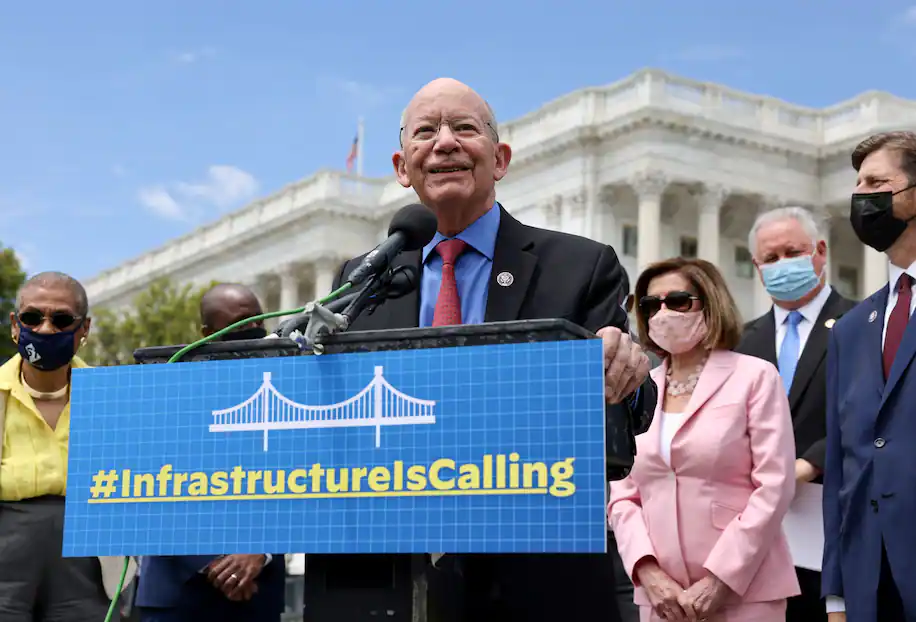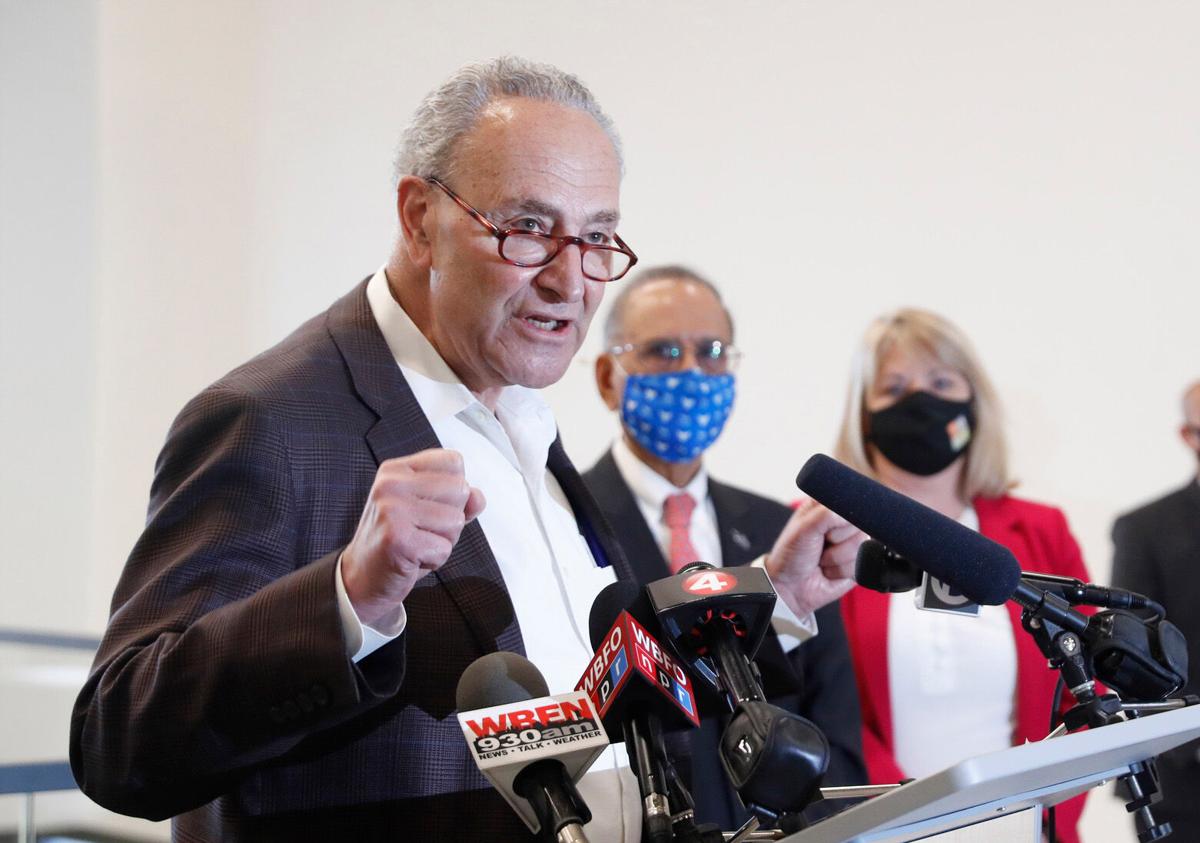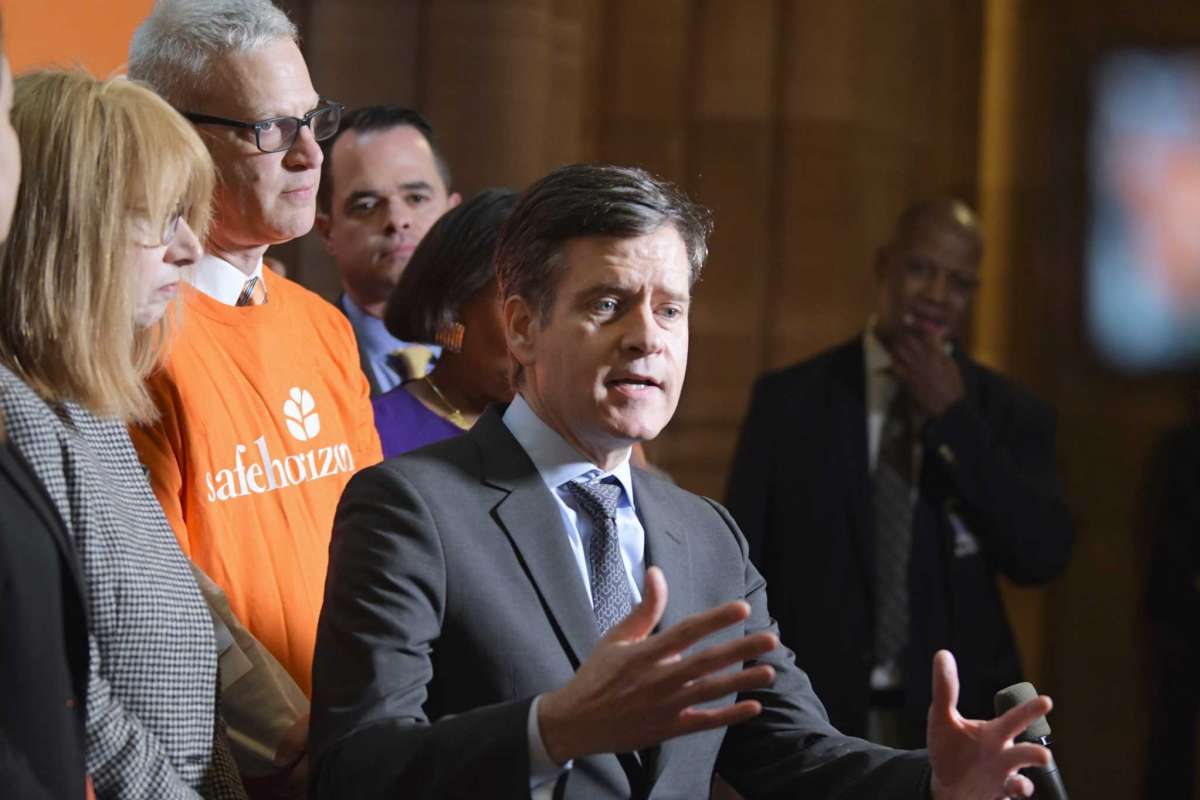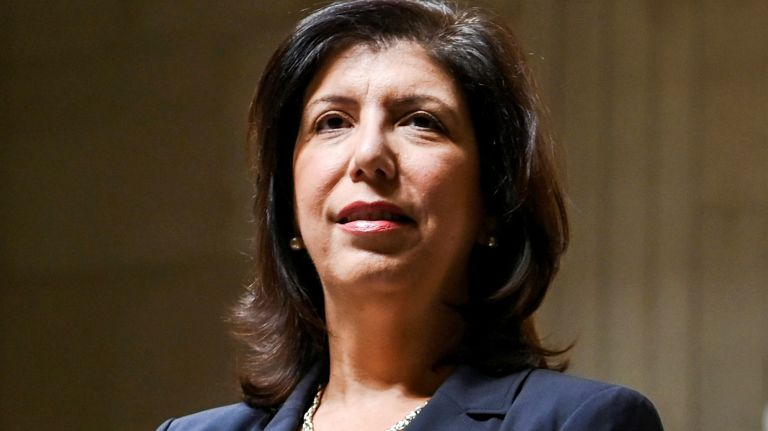Good Morning from Washington, D.C.
Congress returns to Washington this week with a jam-packed four week sprint towards the July 4th recess. At the top of the agenda: infrastructure. Racing towards a self-imposed White House deadline of the end of this week to show “progress” in negotiations, President Biden met again last Wednesday with West Virginia Senator Shelley Moore-Capito, the lead Republican negotiator, to try to resolve major differences over the size, structure, and financing of an expansive package. Coming out of that meeting, the White House made a new $1 trillion offer (slimmed down $700 billion from the last package), which notably dropped the corporate tax increases that would have paid for the Plan (a proposal that Republicans have been dug in against). However, the meeting ultimately failed to produce any agreements, and patience from the Biden Administration with GOP negotiators is waning. One Capitol Wag said of the Biden Plan, “I have a hard time seeing this go ahead because Republicans’ plans always have baseline included; I don’t think Senate Republicans are interested in $1 trillion in new spending, or changing the tax cuts … or raising other taxes — and that’s been clear from Day 1.”
the top of the agenda: infrastructure. Racing towards a self-imposed White House deadline of the end of this week to show “progress” in negotiations, President Biden met again last Wednesday with West Virginia Senator Shelley Moore-Capito, the lead Republican negotiator, to try to resolve major differences over the size, structure, and financing of an expansive package. Coming out of that meeting, the White House made a new $1 trillion offer (slimmed down $700 billion from the last package), which notably dropped the corporate tax increases that would have paid for the Plan (a proposal that Republicans have been dug in against). However, the meeting ultimately failed to produce any agreements, and patience from the Biden Administration with GOP negotiators is waning. One Capitol Wag said of the Biden Plan, “I have a hard time seeing this go ahead because Republicans’ plans always have baseline included; I don’t think Senate Republicans are interested in $1 trillion in new spending, or changing the tax cuts … or raising other taxes — and that’s been clear from Day 1.”
While the Administration grows increasingly impatient, the pressure from Democrats in Congress and progressive groups on the Biden Administration to move forward through budget reconciliation and without Republican votes is mounting and growing increasingly public. A leading progressive climate coalition, the Sunrise Movement (who has generally communicated through official channels with the White House via Senior Administration staff) went rogue on Friday unleashing anger toward the Biden Administration in an open protest at the White House. During the protest, their Executive Director Varshini Prakash said, “I was invited to the Biden-Sanders Unity Taskforce to help Biden craft policy that was in line with what is necessary to meet the crises facing our nation. Biden moved towards us, promising us a future, and in exchange, we worked tirelessly to get him elected. We held up our side of the deal, but now that Biden is in power, that promise of co-governance with progressives and young people has disappeared.”
progressive groups on the Biden Administration to move forward through budget reconciliation and without Republican votes is mounting and growing increasingly public. A leading progressive climate coalition, the Sunrise Movement (who has generally communicated through official channels with the White House via Senior Administration staff) went rogue on Friday unleashing anger toward the Biden Administration in an open protest at the White House. During the protest, their Executive Director Varshini Prakash said, “I was invited to the Biden-Sanders Unity Taskforce to help Biden craft policy that was in line with what is necessary to meet the crises facing our nation. Biden moved towards us, promising us a future, and in exchange, we worked tirelessly to get him elected. We held up our side of the deal, but now that Biden is in power, that promise of co-governance with progressives and young people has disappeared.”
Further, the Biden Administration and Democrats in Congress may only have one more opportunity to get something transformative done by circumventing the filibuster. In an extensive ruling circulated last week, Senate Parliamentarian Elizabeth MacDonough clarified that budget reconciliation vehicles beyond the remaining one in 2021 would require approval of the Senate Budget Committee, which is evenly split at eleven votes for both Republicans and Democrats. Put simply, this is likely Democrats’ last opportunity to go big and bold. With progressives wanting results from campaign promises, two hallmarks of the first 100 days agenda (the American Jobs Plan and American Families Plan), the stakes over the next four weeks could not be higher.
Also on the agenda: the U.S. Innovation and Competition Act—or the “China Bill,” which would set aside more than $250 billion in new funding for research grants and semiconductor production, create regional technology hubs, and help U.S. companies compete with Chinese output. Senators spent the recess week stumping for the bill at manufacturers and tech companies that could stand to benefit across the country, including a visit from Senate Majority Leader Chuck Schumer to Buffalo’s brand new M&T Tech Hub at Seneca One. The Bill—which has significant bipartisan support—was bogged down in procedural votes before the Memorial Day recess, but, in early May, Senators voted overwhelmingly to invoke cloture and it should come to a vote on the floor this week.
than $250 billion in new funding for research grants and semiconductor production, create regional technology hubs, and help U.S. companies compete with Chinese output. Senators spent the recess week stumping for the bill at manufacturers and tech companies that could stand to benefit across the country, including a visit from Senate Majority Leader Chuck Schumer to Buffalo’s brand new M&T Tech Hub at Seneca One. The Bill—which has significant bipartisan support—was bogged down in procedural votes before the Memorial Day recess, but, in early May, Senators voted overwhelmingly to invoke cloture and it should come to a vote on the floor this week.
And in case you missed it, President Biden proposed a $6 trillion budget that would take the United States to its highest sustained levels of federal spending since World War II as he looks to fund a sweeping economic agenda that includes large new investments in education, transportation and fighting climate change. The levels of taxation and spending in the Administration’s plan would expand the federal fiscal footprint to levels rarely seen in the postwar era to fund investments that his administration says are crucial to keeping America competitive. That includes money for roads, water pipes, broadband internet, electric vehicle charging stations, and advanced manufacturing research. For more detail from the Office of Management and Budget, click here.
Back in New York…
From the still closed to the public NYS Capitol, there are just four working days left in the Legislative Session. While there is a great deal of policy outstanding—the New York Privacy Act, criminal justice reform, gig economy and the Adult Survivors Act… just to name a few—it is unclear whether Legislators will actually get any deals done next week, or punt for 2022. The Adult Survivors’ Act—which would unlock a one year lookback window—passed the Senate Thursday, but it is not yet scheduled for a vote in the Assembly. Gig economy is on life support after it lost the support of key labor groups earlier this year. And finally, criminal justice advocates are hoping to get a number of reforms—including the “Clean Slate” bill, which would eventually fully expunge certain criminal records—done before the Legislature adjourns June 10th, but we have yet to see any clear movement towards passage.
While there is a great deal of policy outstanding—the New York Privacy Act, criminal justice reform, gig economy and the Adult Survivors Act… just to name a few—it is unclear whether Legislators will actually get any deals done next week, or punt for 2022. The Adult Survivors’ Act—which would unlock a one year lookback window—passed the Senate Thursday, but it is not yet scheduled for a vote in the Assembly. Gig economy is on life support after it lost the support of key labor groups earlier this year. And finally, criminal justice advocates are hoping to get a number of reforms—including the “Clean Slate” bill, which would eventually fully expunge certain criminal records—done before the Legislature adjourns June 10th, but we have yet to see any clear movement towards passage.
After hosting a hearing on the implementation of the Climate Leadership and Community Protection Act in mid-May, lawmakers have decided to punt on any subsequent sweeping climate legislation—like the Climate and Community Investment Act or legislation creating a carbon tax—before the end of session, instead awaiting the results of a key report from the Climate Action Council. Many lawmakers have cited the importance of third-party validation of key policies by a quasi-independent council. “I’m hoping that we see a validation of the idea of a carbon tax from the climate council,” said Assemblymember Steve Englebright (D-Suffolk), who chairs the chamber’s environmental conservation committee. “We need to have that third-party validation … If the public doesn’t see that as something in their best interest, you’ll see people who voted for it rejected.”
Community Investment Act or legislation creating a carbon tax—before the end of session, instead awaiting the results of a key report from the Climate Action Council. Many lawmakers have cited the importance of third-party validation of key policies by a quasi-independent council. “I’m hoping that we see a validation of the idea of a carbon tax from the climate council,” said Assemblymember Steve Englebright (D-Suffolk), who chairs the chamber’s environmental conservation committee. “We need to have that third-party validation … If the public doesn’t see that as something in their best interest, you’ll see people who voted for it rejected.”
All that said, it is important to keep in mind that four days in Albany is a lifetime. For historical context, the aforementioned Climate Leadership and Community Protection Act, the overarching climate regime that now effectively governs all state environmental conservation efforts on emissions reductions and renewable energy, was three-way negotiated, amended, moved through Committee, passed on the Floor of both Houses, and signed all in the final three days of Legislative Session in 2019. In short, keep your eyes on Albany until they officially adjourn this Thursday.
Beyond the end of session “policy” business, the Senate will consider a mountain of outstanding nominations this week. Today, the Senate Finance Committee will consider one of the longest lists of nominations in recent memory with over one hundred nominees (fifteen of whom will appear in person before the Committee). Most notably, the Committee will consider the nomination of Governor Andrew Cuomo’s Budget Director Robert Mujica for the City University of New York Board of Trustees. Those nominations and their confirmation votes could bring some last minute fireworks; progressive activists have mounted an effort to block the confirmation of Nassau County District Attorney Madeline Singas to New York’s highest court. Singas’ opponents launched a website and a Twitter campaign to persuade senators not to appoint another prosecutor to the Court of Appeals. Progressives—like Peter Martin, a lawyer and a volunteer with the New York City Democratic Socialists of America—have said the addition of another suburban prosecutor to the seven-member bench would “undo years of criminal justice reform and reverse victories for tenants and workers.” However for now, the confirmation is moving forward with Senators planning to take it up this week—the Senate Judiciary Committee is set to consider her nomination as a part of a longer list tomorrow, June 8th, and the full Senate will likely take up the vote this Wednesday, June 9th.
week. Today, the Senate Finance Committee will consider one of the longest lists of nominations in recent memory with over one hundred nominees (fifteen of whom will appear in person before the Committee). Most notably, the Committee will consider the nomination of Governor Andrew Cuomo’s Budget Director Robert Mujica for the City University of New York Board of Trustees. Those nominations and their confirmation votes could bring some last minute fireworks; progressive activists have mounted an effort to block the confirmation of Nassau County District Attorney Madeline Singas to New York’s highest court. Singas’ opponents launched a website and a Twitter campaign to persuade senators not to appoint another prosecutor to the Court of Appeals. Progressives—like Peter Martin, a lawyer and a volunteer with the New York City Democratic Socialists of America—have said the addition of another suburban prosecutor to the seven-member bench would “undo years of criminal justice reform and reverse victories for tenants and workers.” However for now, the confirmation is moving forward with Senators planning to take it up this week—the Senate Judiciary Committee is set to consider her nomination as a part of a longer list tomorrow, June 8th, and the full Senate will likely take up the vote this Wednesday, June 9th.
-Jack O’Donnell
FOR DAILY UPDATES, FOLLOW US:
A New Day in Tonawanda: The Implosion of the Smokestacks at the Former Tonawanda Coke
Will Cuomo Run for a 4th Term? A $10,000-a-Plate Fund-Raiser Says Yes.
The event on June 29 will be the first fund-raiser for Mr. Cuomo since overlapping investigations engulfed his administration earlier this year. [Read more.]
CNN Under Ethics Scrutiny Following Cuomo Revelations
CNN is coming under internal and external criticism over its approach to conflicts of interest for journalists after host Chris Cuomo escaped disciplinary action despite advising his brother, Gov. Andrew Cuomo, on how to handle sexual misconduct allegations. [Read more.]
NYS Legislature: new member spotlight
A businessman and entrepreneur, Chris Jacobs won a Special Election in June 2020 to represent New York’s 27th Congressional District, encompassing parts of Erie, Niagara, Ontario, Orleans, Wyoming, Livingston, Genesee, and Monroe Counties. In the Special Election, Jacobs had the enthusiastic support of President Donald Trump, although some (especially his primary opponents for the seat) saw him more as a moderate Republican. NY’s 27th CD had become vacant when Chris Collins pleaded guilty to federal insider trading charges.
A former Buffalo School Board member and charter school advocate, Jacobs was serving in the New York State Senate prior to his election to Congress. He also served as Erie County Clerk from 2011-2016. Jacobs founded the BISON Children’s Scholarship Fund which promotes educational opportunities for students in Western New York. He also served as New York’s Secretary of State under Governor George Pataki.
Congressman Jacobs was born in Buffalo, NY and was one of 5 siblings. He earned his undergraduate degree from Boston College, has a master’s degree from American University and a Juris Doctorate from University of Buffalo Law School.
This session he serves on the Committee on Agriculture and the Committee on the Budget. He is also a member of the Republican Main Street Partnership and the Republican Study Committee. He currently resides in Orchard Park, NY with his wife and daughter.


